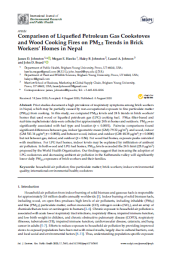Comparison of Liquefied Petroleum Gas Cook stoves and Wood Cooking Fires on PM2.5 Trends in Brick Workers’ Homes in Nepal
Summary
This is the first study to characterize indoor PM2.5 levels in brick workers’ homes in Nepal for an approximately 24h period. One strength of this study design is that the simultaneously collected filter-based (gravimetric) and optical particle counts, allowed the researchers to identify PM2.5 trends over time which permitted them not only to identify mean differences between wood and LPG fuel homes but also to see the influence that cooking has on indoor pollution levels, which was not studied in previous researches.
Categories:
Case Studies
Publisher:
International Journal of Environmental Research and Public Health
Published Year:
2020
